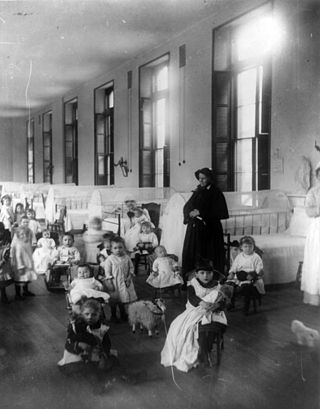
Developmental psychology is the scientific study of how and why humans grow, change, and adapt across the course of their lives. Originally concerned with infants and children, the field has expanded to include adolescence, adult development, aging, and the entire lifespan. Developmental psychologists aim to explain how thinking, feeling, and behaviors change throughout life. This field examines change across three major dimensions, which are physical development, cognitive development, and social emotional development. Within these three dimensions are a broad range of topics including motor skills, executive functions, moral understanding, language acquisition, social change, personality, emotional development, self-concept, and identity formation.

Adoption is a process whereby a person assumes the parenting of another, usually a child, from that person's biological or legal parent or parents. Legal adoptions permanently transfer all rights and responsibilities, along with filiation, from the biological parents to the adoptive parents.

A nuclear family, elementary family, atomic family, cereal packet family or conjugal family is a family group consisting of parents and their children, typically living in one home residence. It is in contrast to a single-parent family, a larger extended family, or a family with more than two parents. Nuclear families typically center on a married couple which may have any number of children. There are differences in definition among observers. Some definitions allow only biological children who are full-blood siblings and consider adopted or half- and step-siblings a part of the immediate family, but others allow for a step-parent and any mix of dependent children, including stepchildren and adopted children. Some sociologists and anthropologists consider the extended family structure to be the most common family structure in most cultures and at most times, rather than the nuclear family.
An extended family is a family that extends beyond the nuclear family of parents and their children to include aunts, uncles, grandparents, cousins or other relatives, all living nearby or in the same household. Particular forms include the stem and joint families.

Social mobility is the movement of individuals, families, households or other categories of people within or between social strata in a society. It is a change in social status relative to one's current social location within a given society. This movement occurs between layers or tiers in an open system of social stratification. Open stratification systems are those in which at least some value is given to achieved status characteristics in a society. The movement can be in a downward or upward direction. Markers for social mobility such as education and class, are used to predict, discuss and learn more about an individual or a group's mobility in society.
Nancy Julia Chodorow is an American sociologist and professor. She began her career as a professor of Women's studies at Wellesley College in 1973, and from 1974 on taught at the University of California, Santa Cruz, until 1986. She then was a professor in the departments of sociology and clinical psychology at the University of California, Berkeley until she resigned in 1986, after which she taught psychiatry at Harvard Medical School/Cambridge Health Alliance. Chodorow is often described as a leader in feminist thought, especially in the realms of psychoanalysis and psychology.

Sociology of the family is a subfield of the subject of sociology, in which researchers and academics study family structure as a social institution and unit of socialization from various sociological perspectives. It can be seen as an example of patterned social relations and group dynamics.

Paul Dourish is a computer scientist best known for his work and research at the intersection of computer science and social science. Born in Scotland, he holds the Steckler Endowed Chair of Information and Computer Science at the University of California, Irvine, where he joined the faculty in 2000, and where he directs the Steckler Center for Responsible, Ethical, and Accessible Technology. He is a Fellow of the AAAS, the ACM, and the BCS, and is a two-time winner of the ACM CSCW "Lasting Impact" award, in 2016 and 2021.

LGBT parenting refers to lesbian, gay, bisexual, and transgender (LGBT) people raising one or more children as parents or foster care parents. This includes: children raised by same-sex couples, children raised by single LGBT parents, and children raised by an opposite-sex couple where at least one partner is LGBT.

A parenting style is a pattern of behaviors, attitudes, and approaches that a parent uses when interacting with and raising their child. The study of parenting styles is based on the idea that parents differ in their patterns of parenting and that these patterns can have a significant impact on their children's development and well-being. Parenting styles are distinct from specific parenting practices, since they represent broader patterns of practices and attitudes that create an emotional climate for the child. Parenting styles also encompass the ways in which parents respond to and make demands on their children.
Curriculum studies is a concentration in the different types of curriculum and instruction concerned with understanding curricula as an active force influenced by human educational experiences. Its proponents investigate the relationship between curriculum theory and educational practice in addition to the relationship between school programs, the contours of the society, and the culture in which schools are located.

Family is a group of people related either by consanguinity or affinity. It forms the basis for social order. The purpose of the family is to maintain the well-being of its members and of society. Ideally, families offer predictability, structure, and safety as members mature and learn to participate in the community. Historically, most human societies use family as the primary locus of attachment, nurturance, and socialization.

The BYU College of Family, Home, and Social Sciences is a college located on the Provo, Utah campus of Brigham Young University and is housed in the Spencer W. Kimball Tower and Joseph F. Smith Building. The BYU College of Family Living was organized on June 28, 1951, while the BYU College of Social Sciences was organized in 1970. These two colleges merged to form the current college in 1981. The first dean of the college was Martin B. Hickman. The college includes nine major departments: Anthropology, Economics, Geography, History, Political Science, Psychology, The School of Family Life, Social Work, and Sociology. There are 21 different majors and 21 different minors that students can choose from, including 9 majors that have a correlating minor.
Intergenerationality is interaction between members of different generations. Sociologists study many intergenerational issues, including equity, conflict, and mobility.
Ronald Jay Werner-Wilson, Chair of the Family Studies Department and Kathryn Louise Chellgren Endowed Professor for Research in Family Studies at the University of Kentucky, is a scholar who has held faculty appointments since 1993. His has published one book, book chapters, and numerous peer-reviewed journal articles. He has investigated family and relationship influences on adolescent and young adult sexuality, positive youth development, therapy with adolescents, gender and power influences on therapeutic process, and physiological influences on family interaction.
Mark Daniel Regnerus is a sociologist and professor at the University of Texas at Austin. His main fields of interest are sexual behavior, relationship dynamics, and religion.
The New Family Structures Study is a sociological study of LGBT parenting conducted by sociologist Mark Regnerus of the University of Texas at Austin. The study surveyed over 15,000 Americans of ages 18 to 39. The first research article based on data from the study was published in July 2012 in Social Science Research, and concluded that people who had had a parent who had been in a same-gender relationship were at a greater risk of several adverse outcomes, including "being on public assistance, being unemployed, and having poorer educational attainment."
Sandra L. Hofferth is a Professor, the Department of Family Science, University of Maryland School of Public Health in the United States, and Director, Maternal and Child Health Bureau. She is the former co-director of the Michigan Panel Study of Income Dynamics and founding Director of its Child Development Supplement. Her research focuses on American children's use of time; poverty, food insecurity, public assistance, and child health and development; and fathers and fathering. Hofferth is the author of more than 100 articles and five books. Dr. Hofferth studies employment and parenting among women and most recently has extended this interest to men. Her current research focuses on the transition of young men to adulthood, particularly disadvantaged young men. Her papers have examined the link between the timing of childbirth and relationship outcomes for young men, factors influencing the transition of young men into residential and nonresidential fatherhood, the consequences of children for young men's relationships, and how young men's and their partner's employment experiences affect their relationships with children.

Pearl A. Dykstra is a Dutch social scientist with a background in sociology, psychology, gerontology and demography. She is a specialist on intergenerational solidarity, aging societies, family change, aging and the life course, and loneliness.
Debra J. Umberson is an American sociologist. She is a professor of sociology at the University of Texas at Austin and director of the Population Research Center.










